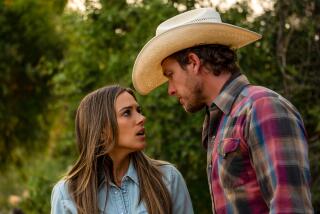Eternity Is Now: Just Ask Scrooge and George Bailey
- Share via
To my mind, there are only two truly great Christmas movies: “Scrooge,” the 1951 adaptation of Charles Dickens’ “A Christmas Carol,” starring Alastair Sim, and Frank Capra’s “It’s a Wonderful Life,” starring James Stewart.
The first I watch every year. I think “A Christmas Carol” is one of the greatest pieces of wisdom literature the West has produced and, lover of Dickens though I am, I heretically believe this film version improves the original. It takes the story a little more seriously, adding more humanity to the satire and producing more real emotion.
The Capra picture isn’t quite as durable for me but, after half a dozen viewings, I can still watch it with pleasure.
One thing that’s always struck me about these two films is that they’re essentially mirror images of each other.
In “Scrooge,” a man grown rich because of heart-shriveling greed is forced by spirits to view the consequences of his existence.
In “It’s a Wonderful Life,” George Bailey, a man in financial trouble because of his large-souled generosity, is forced by an angel to view the consequences of his non-existence: what would’ve happened if he’d never been born.
On both sides of the mirror, the results are the same: a revolutionary personal transformation, what the New Testament calls “metanoia,” which is often translated as “repentance” but which means literally “a change of mind.”
After the metanoia, there’s a lot of Christmas caroling and happiness and that sort of thing. Thus movie critics -- who frequently confuse darkness with depth -- sometimes belittle these films as sentimental.
They’re wrong. Watched carefully, the films are disturbingly realistic. Because, for each protagonist, the change in outlook has absolutely nothing to do with a change in circumstance. They aren’t singing carols and so forth because they’ve won the girl or beaten the villain or made millions or righted wrongs. Scrooge can never bring justice to the people he’s ruined, and Bailey will never become the world-traveling architect he wanted to be.
And yet, in the aftermath of their visions, both men are joyous.
“I don’t deserve to be so happy,” Scrooge mutters. “But I can’t help it!” And Bailey lets out a heartfelt “Yay!” when the angel returns him to the dreary town that has been the graveyard of his ambitions.
This hard-nosed realism about the indelibility of sin and failure is precisely the difference between Dickens and Dickensian, between Capra and Capra-esque -- between happy endings rich with sentiment and those soggy with sentimentality. It is also, for me, the very best of what faith has to offer.
Scrooge and Bailey, by confronting their mortality, are forced to acknowledge that life is wonderful not because of what happens in it but simply by virtue of being life. They are able, as Scrooge says, to “live in the past, the present and the future,” which is to say they are able to live in eternity. Which is what faith promises.
In eternity, sins are washed clean not by punishment but by inner transformation; success is measured in love, not money; joy rises above circumstance; and dread is a delusion. “And throughout all eternity,” in the words of the mystical poet William Blake, “I forgive you, you forgive me.”
Some attack this sort of thinking as an excuse for passivity or an opiate for the masses. If we can be forgiving and joyous in spite of injustice and failure, why should we dedicate ourselves to justice and success?
But this, as Blake interpreter Northrop Frye once wrote, is to “confuse the eternal with the indefinite.” Eternity is not a lot of time, it’s all time, or more precisely, it’s right now, where all time lives. To be in this very moment as if it were forever is not to stop the work of life but to begin it afresh in celebration.
Scrooge and George Bailey, in traveling through misery to see the eternal born in time, are descendants of those wise men who traveled through the wilderness to see God born into history.
To such a vision -- amid failure and sin, and even in the face of death -- there is only one response: Yay.
Andrew Klavan is a novelist, essayist and screenwriter. His latest novel, “Dynamite Road” (Forge), was published in November.
More to Read
Only good movies
Get the Indie Focus newsletter, Mark Olsen's weekly guide to the world of cinema.
You may occasionally receive promotional content from the Los Angeles Times.








